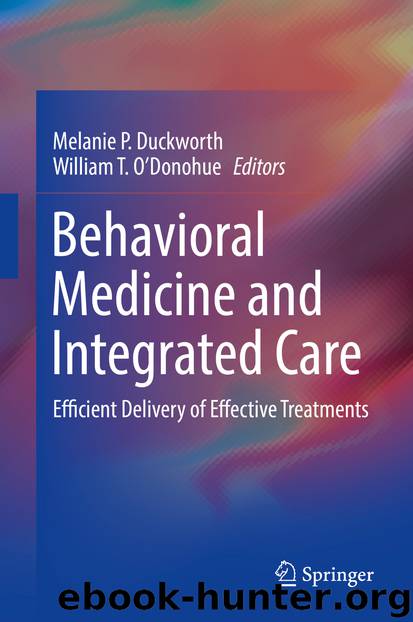Behavioral Medicine and Integrated Care by Unknown

Author:Unknown
Language: eng
Format: epub
ISBN: 9783319930039
Publisher: Springer International Publishing
Relaxation Techniques and Meditation
Similar to the relation of mood to behavior, the negative influence of stress on physical health outcomes is well documented (Thoits, 2010). Due to the stress associated with chronic medical conditions, relaxation training should be an integral part of treatment for patients with MCC. Relaxation and meditation can be performed in a number of ways, including progressive muscular relaxation, mindfulness meditation, meditative relaxation, transcendental meditation, guided imagery, and breathing retraining. Based on their 2005 review, Schneider et al. concluded that across cardiovascular disease risk factors including blood pressure, cholesterol, and smoking, transcendental meditation was found to be an effective risk reduction strategy. Across cardiovascular events and endpoints including myocardial ischemia, left-ventricular mass, and atherosclerosis, transcendental meditation effectively increased exercise tolerance and maximum work load. Across physiological neuroendocrine mechanisms that contribute to cardiovascular compromise, including baseline levels of respiration and heart rate, spontaneous skin resistance, heart rate reactivity, sympathetic adrenergic receptor sensitivity, and basal and average cortisol levels, transcendental meditation effectively reduced stress and increased relaxation. In a more recent meta-analysis examining the impact of transcendental meditation on cardiovascular health, Schneider and Carr (2014) found transcendental meditation was associated with decreased cardiovascular disease risk factors including hypertension, psychosocial stress, and smoking as well as cardiovascular events.
In addition to the physical benefits, relaxation and meditation can also help patients with MCC manage psychological distress. In their systematic review and meta-analysis examining the physiological and psychological effects of meditation, Goyal et al. (2014) found that meditation was associated with significant decreases in anxiety, depression, and pain. Galante, Galante, Bekkers, and Gallacher (2014) conducted a meta-analysis examining the influence of kindness-based meditation on psychological health outcomes. The results revealed that kindness-based meditation was associated with significant decreases in depression and significant increases in mindfulness and self-compassion . Given the comorbidity of chronic conditions and psychiatric conditions, these collective findings suggest that relaxation and meditation should be included as treatment components in the management of MCC.
Download
This site does not store any files on its server. We only index and link to content provided by other sites. Please contact the content providers to delete copyright contents if any and email us, we'll remove relevant links or contents immediately.
The Secrets of Successful Financial Planning by Dan Gallagher(1183)
A Knight's Reward by Catherine Kean(1106)
An American Sickness by Elisabeth Rosenthal(1031)
Against the Gods by Peter L. Bernstein(879)
America's Bitter Pill: Money, Politics, Backroom Deals, and the Fight to Fix Our Broken Healthcare System by Steven Brill(858)
FREAKONOMICS by levitt steven d(852)
SuperFreakonomics by Steven D. Levitt(840)
America's Bitter Pill by Steven Brill(814)
Risk Management Framework by James Broad(807)
2019 Social Security & Medicare Facts by Michael D. Thomas(790)
A Practical Introduction to Security and Risk Management by Bruce Oliver Newsome(782)
Strategic Risk Taking: A Framework for Risk Management by Aswath Damodaran(781)
Game Changers by Rudolf Taschner(764)
How Our Days Became Numbered: Risk and the Rise of the Statistical Individual by Dan Bouk(746)
The New Frontier Investors by Jagdeep Singh Bachher Adam D. Dixon & Ashby H. B. Monk(737)
The Globetrotter's Guide to Travel Insurance: Travel Smarter, Pay Less, Get the Right Coverge (The Savvy Traveler Series Book 1) by Bauche Michael & Bauche Yvonne(716)
The 8 Characteristics of the Awesome Adjuster by Carl van Lamsweerde(710)
SUPERFREAKONOMICS by levitt steven d(705)
The Advisor Playbook: Regain Liberation and Order in your Personal and Professional Life by Duncan MacPherson & Chris Jeppesen(667)
